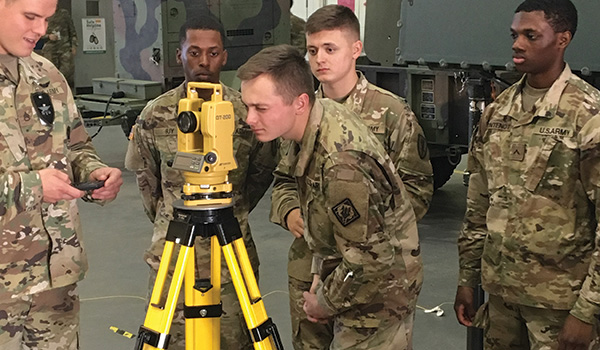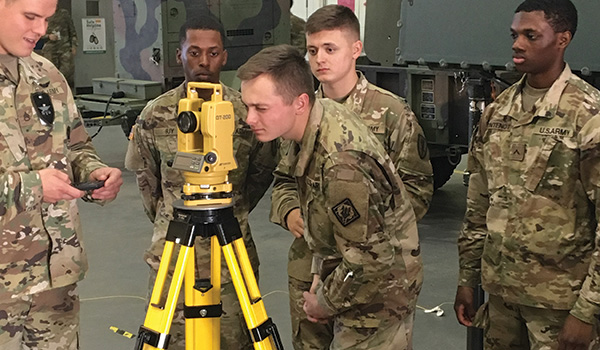
By CSM Gregory M. Chambers: The Aviation Branch has 16 different military occupational specialties (MOSs) within the Branch that we use to accomplish very specific tasks from the tactical level up to the strategic level.

AIT Soldiers from the 1st Bn., 13th Avn. Regt., 1st Avn. Bde., training on the operation of the “Theodolite” system as part of the 15Q qualification course at Fort Rucker, Nov 2017. / U.S. ARMY PHOTO
Although most of our enlisted skills are used at the tactical and operational level, two of our MOSs are used to conduct aviation operations at all levels. Our 15Ps (Aviation Operations) and 15Qs (Air Traffic Control) conduct deliberate tasks on a daily basis in order to accomplish our stated Aviation mission at all levels of Army command.
Requirements
As with any MOS in the Army there must be a “requirement” for a specific skill. Our 15Ps and 15Qs provide our Aviation forces or units specific Aviation skills that support the employment of our Branch weapons, our aircraft. Their skills are centered on “operations;” just as our maintainers are centered around and trained to “maintain” our aircraft, our 15Ps and 15Qs are specifically trained to conduct and support any type of Aviation mission within the Army.
Our 15Ps provide critical operational skills that support Aviation units from the company to the corps level. Whether it’s flight operations, flight record actions, battle staff operations, unit training management, or working as part of the military decision making process (MDMP) team in an S-3 or tactical operations center our 15Ps are relied upon to manage the business of Aviation Operations and are specifically trained to accomplish these important tasks.
Our 15Qs are responsible for the safe movement of our weapons (aircraft) both in garrison and in combat. Our air traffic controllers work from the tactical level all the way to theater level managing the safe transit of our aircraft. Whether it’s providing detailed flight information, controlling aircraft in instrument or visual flight rules (IFR/VFR) conditions, managing ATC towers and ground operations, or installing critical flight navigational aids our 15Qs ensure our Aviation crews get to where they are going safely and efficiently. They provide a vital role in every Aviation operation that we conduct.
Training
Critical to the success of any MOS in the Army is what we train our Soldiers to do in order for them to accomplish their job and to be successful. There are “Institution” training tasks, “Operational” unit trained tasks and individual Soldier development or “Self” domain tasks that leaders and Soldiers have to follow to stay proficient and to progress within their MOS. As with any MOS every Soldier has an Individual Critical Task List or ICTL. Our 15Ps have 82 ICTs and our 15Qs have 80 with the concentration of these tasks in the 10 and 30 level grade plates. Additionally, they both share numerous tasks at the 10 and 20 level grade plates. It’s extremely important to understand what is taught in the Institution and what is required to be trained in the operational units. Currently, 27 of the 82 ICTs for the 15P and 43 of the 80 ICTs for the 15Q are required to be taught in the operational units. These tasks are to be trained on a monthly, quarterly, semi-annual and annual basis.
We owe our Soldiers good leadership, and a solid metric that backs up good leadership is a comprehensive training plan, especially for our younger Soldiers. Our 15Ps and 15Qs are force multipliers when it comes to Aviation operations and the key to this multiplier is ensuring we have a solid progression plan in place when we receive these Soldiers into our formations. Using the ICTLs as a foundation plan for our 15Ps and 15Qs is a good start, but the type of unit, the location of the unit and specific mission sets also drive the training plan for these MOSs. Regardless of unit type or location, what’s important and critical for both of these MOSs is their individual training plan. Both MOSs have very detailed and complex tasks and they require frequent iterations to stay proficient.
Our aviation operations specialists and air traffic controllers provide our units unique skills that enable us to be highly successful on the battlefield. We owe it to them to ensure they are trained to a high level of proficiency so we are all successful.
“Above the Best!”
CSM Chambers
This email address is being protected from spambots. You need JavaScript enabled to view it.
CSM Gregory M. Chambers is the command sergeant major of the Aviation Branch and the U.S. Army Aviation Center of Excellence, Fort Rucker, AL.








